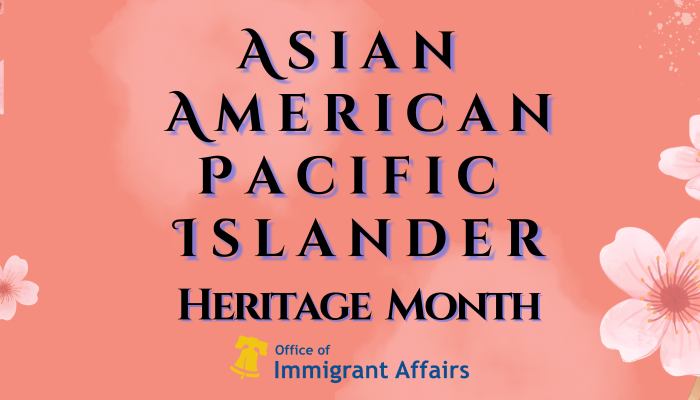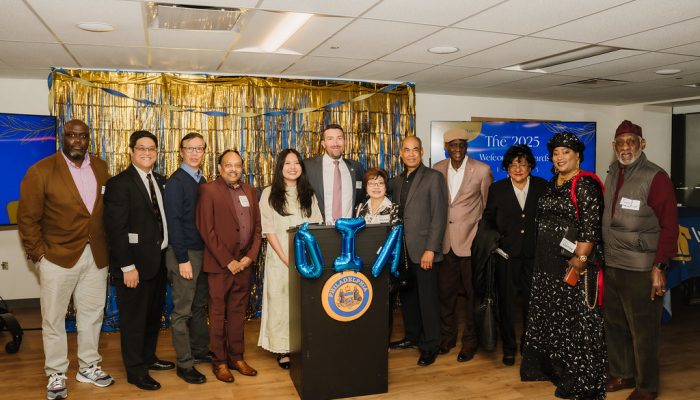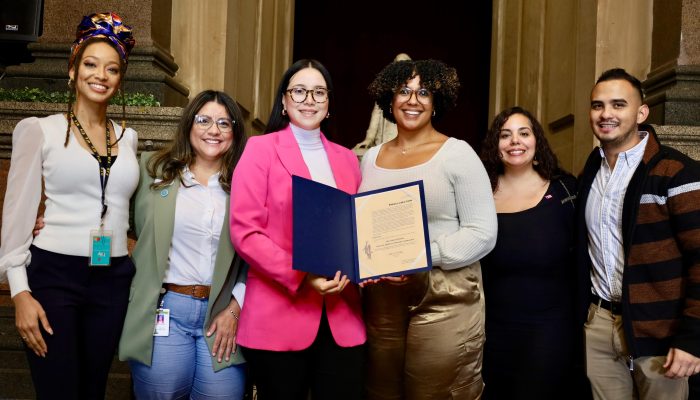In honor of Asian American and Pacific Islander (AAPI) Heritage Month, the Office of Immigrant Affairs interviewed Katerina Montaniel and Yushan Chou, two leaders from the City of Philadelphia’s AAPI City Resource Group (CRG), on behalf of the AAPI CRG Leadership Team: Wei Liu, Tina Ngo, Sarorng Sorn, and Brenna Schmidt. The interviews highlight how the City supports its immigrant employees, the role of CRGs in building community and professional growth, and the importance of AAPI representation in local government.
Can you let people who do not know what API CRG is understand what it is and why it was created?
The Asian American & Pacific Islander City Resource Group, or AAPI CRG, is one of several CRGs. CRGs are groups of City employees who are members and allies of diverse communities. The groups discuss how we can make the City a better place to work for these communities. CRGs are driven by employees and focus on:
- Networking.
- Talent development.
- Creating at least one program or initiative a year that promotes diversity and inclusion in the workforce.
The CRG’s founding leadership team envisioned the CRG as a way to create a space for City employees and allies to heal and build community. (Office of Diversity, Equity and Inclusion & Stand Up, Speak Up, Let’s Keep Each Other Safe)
Our mission is to uplift and unite the Asian, Asian American, and Pacific Islander communities within the City’s workforce by championing racial, economic, and language justice, informing policy, and celebrating cultural diversity. We value the richness within our AAPI community and stand in solidarity with other marginalized groups.
Past AAPI CRG events have included after-work walks, food meetups (like Chinatown and the Southeast Asian Market), and talks with Asian American storytellers—from travel reflections to podcast hosts and filmmakers. We recently visited the 21st National Arts Program Exhibit at City Hall, where members showcased their art. We look forward to more member-led events ahead. (KM)
What support systems are available within the city for AAPI employees, and how have they helped you thrive in your role?
After four years in the City, I’m still learning what the support systems are. They are also changing as administrations change. I remember learning about the AAPI CRG in summer 2022, almost two years after I began my job, via the Employee Newsletter. (KM)
What does it mean to you, personally and professionally, to work for the city as an AAPI individual, and how has your identity influenced your work in local government?
Working in the City has allowed me to connect with more AAPI communities – both my own and also other ethnic subgroups across the City. It has been so energizing to connect with so many people, especially after over a decade in the City where I didn’t connect with many AAPI people regularly. It has also been so energizing to see my fellow AAPI colleagues doing their work up close. My preference for collaboration and working across groups comes from being part of a collective culture. To work in the City as an AAPI individual means learning our histories, understanding how our communities are intertwined with marginalized communities in the City, and knowing about past and present Asian and Black solidarity in Philadelphia. (KM)
In what ways do AAPI employees support each other within the city, both professionally and personally? Are there specific networks or initiatives that help foster community?
AAPI employees support each other through formal networks, mentorship programs, and community-building initiatives that foster a sense of belonging and professional growth. The city employee resource groups (CRGs), provide a safe space for networking, career development, and advocating for issues that impact AAPI communities. The group helps employees navigate workplace challenges, connect with leadership, and collaborate on initiatives that promote diversity, equity, and inclusion. Beyond professional support, AAPI employees also foster community through cultural celebrations, social gatherings, and peer mentorship. Events recognizing AAPI Heritage Month, informal networking lunches, collaborations with local organizations help strengthen relationships and build solidarity within the workplace and the broader community. These efforts create a strong support system and ensure that AAPI city employees feel valued, empowered, and connected. (YC)
Are there any challenges you face as an AAPI employee in local government. If so, how have you been able to navigate those challenges?
As an AAPI employee in local government, one challenge I’ve faced is the lack of representation in leadership roles. AAPI individuals are often underrepresented in decision-making spaces. To address this, I’ve joined employee resource groups, had open conversations with colleagues about issues I care about, and pursued professional development to strengthen my voice in the workplace. (YC)
Yes, definitely—and most challenges I’ve personally faced are structural, not personal. A major issue is simply showing that AAPI communities face real struggles, often overlooked because of the harmful model minority myth. This leads to more barriers: finding AAPI peers and mentors, gaining leadership support for outreach, building trust with AAPI communities, ensuring culturally appropriate services, and pushing for AAPI data that is broken down by ethnic group. Disaggregated data—covering over 50 distinct AAPI subgroups—reveals specific needs. For instance, it helps us know we need Indonesian and Khmer interpreters at a South Philly health fair, or Vietnamese and Korean flyers for outreach in the Northeast. To tackle these challenges, I collaborate with AAPI colleagues across the City and country, work with allies in other departments, and stay connected to AAPI community groups to listen and respond to their needs. I hope that one day, we can say we’ve fulfilled even a small part of this responsibility. (KM)
As we celebrate AAPI Heritage Month, what message would you like to share with fellow AAPI individuals who are considering a career in local government?
Local government jobs can be exempt, non-exempt, or contract roles—even within the same department or division. Some rely more on federal funding, which may be stable or uncertain over time. These differences can be challenging, even when we’re deeply committed to our mission and work. (KM)
We want to encourage fellow AAPI individuals to consider a career in local government as a powerful way to uplift our communities and make sure our voices are heard. Representation matters, and our experiences can help shape policies that reflect our communities’ diversity and needs. While challenges may come up, you are not alone—there’s a growing network of AAPI leaders, mentors, and allies ready to support you. Your presence can inspire others and make a lasting impact. We need more AAPI voices at the table to build a more inclusive and equitable future. (YC)
How can existing city employees join the API CRG group?
The AAPI CRG meets monthly, both virtually and in person. City employees can email Brenna Schmidt at Brenna.Schmidt@phila.gov to join the group or leadership team.




